
Spring Lawn Care Tips
Spring, we love it for many reasons. Things are starting anew, fragrant blossoms fill the air, butterflies are arriving, and the boys of summer are getting their gloves and bats ready for play. For many of us, it is also the time to transition our lawn from winter to spring and bring it back to life.
We know how tough it can be to allow our lawn to go dormant over the winter. We may have let our lawns go from green to brown, but with a little bit of effort, we can bring it back to life so that we can enjoy the look and feel of a beautiful lawn. Dust off those bocce balls and fire up the barbecue, it’s time for some outdoor fun.
Raking:
Even though the ground in our area is dry, it is still a good idea to give your lawn a light raking to get rid of any leaves and other debris from the winter months.
Prevent Weeds:
This is the right time to use a pre-emergent herbicide to stop weeds, such as crabgrass from growing. Visit your nearest Moon Valley Nurseries location, and one of our experts will be glad to help you choose the right one.
Get your Mower Ready:
Take care of your lawnmower so that you can take care of your lawn. This season is a good time to beat the rush and get your mower serviced at your local lawn mower service and maintenance center (or you can do it yourself). Unless you’ve got a lot of experience, take the mower to a professional and let them sharpen the blade. Have the mower blade sharpened once a year so that it can keep your lawn looking nice and healthy!
Mow the Grass:
You can mow the lawn yourself, and if you’ve got kids, you can also provide them with a chore to learn responsibility and give you a little break along the way. Either way, the general rule is to never cut off more than one-third of the lawn’s height, so start cutting it as it begins to grow in late spring, unless you’ve got some severely overgrown grass, in that case, do it now. If it’s cool outside, you’ll want to keep the cool-season grass at about 2-inches tall. Tip: Try not to remove more than one-third of the leaf length in one mowing session.

Manage Thatch on your Lawn:
Your lawn may have a layer of thatch, so this is the best time to remove it before the grass really starts growing in during the summer. Eliminating thatch can allow air and water to reach the roots of the grass easier.
Aeration:
It’s a good time to poke holes in your lawn and doing this can loosen up compacted soil and allow oxygen, water, and nutrients to flow. Aerating your lawn is easier than you think - you can use a variety of tools including golf shoes, a pitchfork, or rent a power aeration tool.
Feed your Lawn:
We recommend applying a layer of compost to the top of your lawn with a spreader. Soils that are rich in decomposed organic materials can do a better job of holding moisture.

Fertilizing:
Get your lawn off to a great start with a light application of fertilizer. Moon Valley Nurseries has got you covered with the perfect fertilizers that help to create a lush, green lawn. Add Moon Valley Nurseries Moon Royale for the best lawn in the neighborhood.
Watering:
Deep watering is better than light watering. Be sure to water your lawn early in the morning or in the evening. You will want to water long enough so that it can allow the water to soak in below the root zone. Be sure not to overwater. In fact, making the lawn seek its own source of water can help it build longer, sturdier roots. Also, excess water can drain away nutrients and may encourage insects. Click here for some watering instructions for your specific region.

Submit a Comment